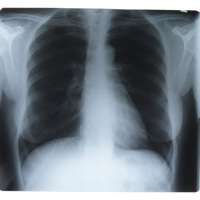Genetic screen finds new treatment targets for lung cancer

Cancer Research UK scientists are the first to use an efficient new screening strategy to identify gene faults in tumour cells that are possible drug targets for the most common form of lung cancer, according to new research published in PNAS today.
Researchers from the Cancer Research UK's Paterson Institute for Cancer Research at The University of Manchester studied six different non-small cell lung cancer (NSCLC) cell lines growing in the lab, each of which was known to carry more than 60 gene faults. To find out exactly which faults were driving the cancer, the scientists specifically switched off each of the different faulty genes in turn, then looked to see if the cells stopped growing.
The team found three key gene faults that lead to the production of overactive proteins, sending signals telling the cells to grow out of control. Importantly, these proteins are potential targets for precision cancer drugs that block specific molecules in tumour cells.
Lung cancer is the second most common type of cancer diagnosed in the UK with around 42,000 new cases a year, accounting for 13 per cent of all cancer cases, and has one of the lowest survival rates of any cancer. Overall, fewer than one in 10 people diagnosed with lung cancer survive for at least five years after diagnosis.
Dr John Brognard, lead author from the Cancer Research UK's Paterson Institute for Cancer Research at The University of Manchester, said: "Our study provides a new approach that can be personalised to an individual patient's tumour and can identify in real time potential drug targets.
"The underlying genetic changes in half of all non-small cell lung cancer remain unknown. Lung cancer is one of the hardest cancers to study and this has left us barren of possible genetic markers that we can target with drugs or other therapies. But this new technique enables us to begin mapping the most likely gene faults that encourage these cancers to grow."
Professor Richard Marais, director of Cancer Research UK's Paterson Institute for Cancer Research at The University of Manchester, said: "Improving survival from lung cancer is an urgent priority for us, and this vital work helps to bring forward personalised medicine for lung cancer patients sooner. Understanding the genetic faults that drive each individual patient's cancer will help to make sure they get the right treatment for their disease, at the right time. This is exactly the kind of work that will take place in the new Manchester Cancer Research Centre currently being built."
More information: Fawdar et al, Targeted genetic dependency screen facilitates identification of actionable mutations in FGFR4, MAP3K9 and PAK5 in lung cancer (2013) PNAS.
















